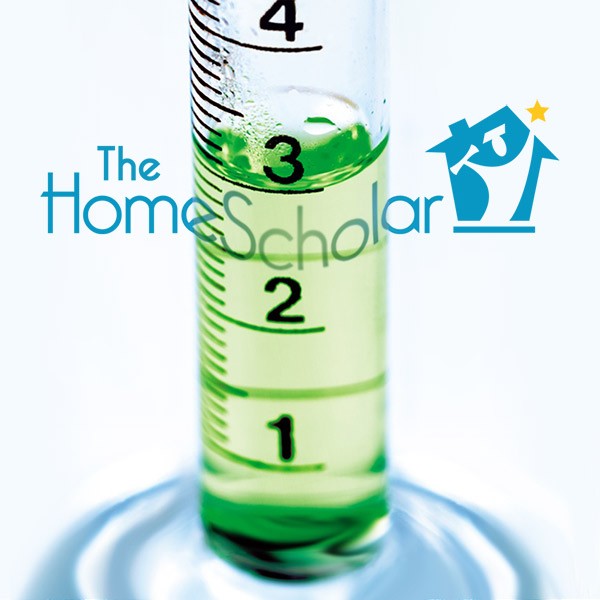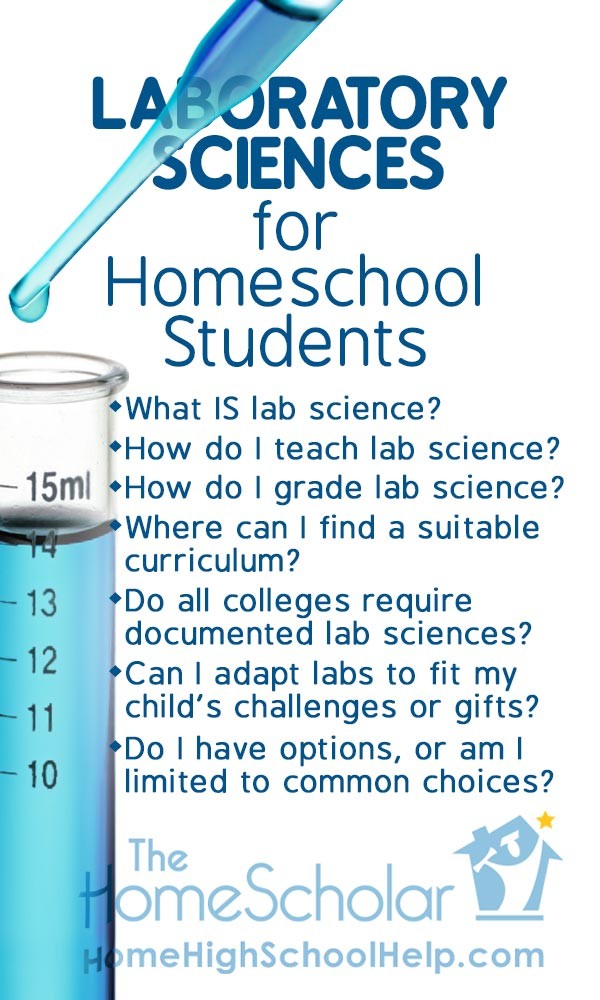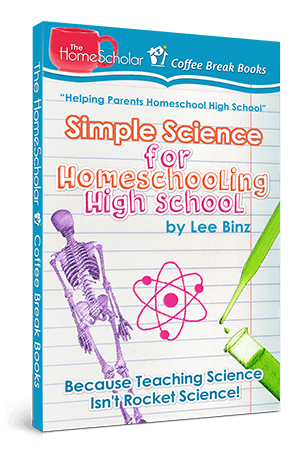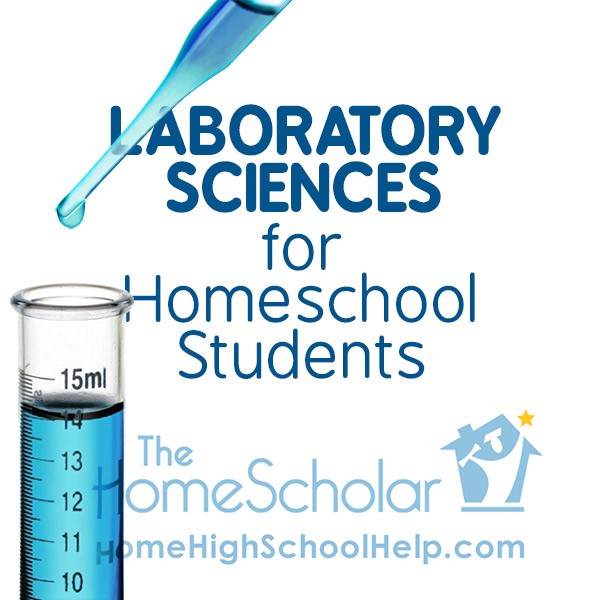Laboratory Sciences for Homeschool Students
Before I became The HomeScholar (and before I began homeschooling) I was a nurse. I loved being a nurse. I loved biology and chemistry. I'm a homeschool mom who loves science! I'm beginning to realize that not all homeschoolers feel the same way. In my work now, I get a lot of questions about teaching homeschool high school science, particularly about science labs. But what is a lab science?
Laboratory science means any instruction that provides opportunities for students to interact directly with the material world, or with data drawn from the material world, using the tools, data collection techniques, models and theories of science.
Most colleges do not require documented lab sciences, but some do. The most important thing for parents is to research the schools where the student plans to apply. Usually, a college that has specific science requirements will also provide a method for them to achieve success. Perhaps they will allow the ACT® science portion to meet the requirement, or they will accept an SAT® score or AP® exam in a science area.
There are many colleges that don't require excessive math or science. Perhaps their emphasis is music, art, or a specific trade, and general sciences meet their admission requirements. There is a very wide variety of colleges that homeschool parents can choose from.
Science Requirements
In general, when I look over the college preparation sites, they don't mention taking a lab science every year. Even the College Board® doesn't specifically mention a lab science. It mentions three years of science, but isn't specific about the lab requirement.
"Science teaches students to think analytically and apply theories to reality. Laboratory classes let students test what they have learned through hands-on work. Six semesters are recommended: two semesters in biology, two semesters in chemistry and/or physics, and two semesters in earth/space sciences, advanced biology, advanced chemistry, or physics."
Public university may have a greater or lesser emphasis in lab science, depending on their preference. But I think it's good to remember that colleges are rarely specific about which sciences, and it's ok for parents to have some delight-directed science courses along with the more ordinary biology, chemistry, and physics choices.
How to Find Curriculum
I'm a huge fan of Apologia sciences! I believe it is wonderful for college preparation, and that their Biology, Chemistry, and Physics can provide the highest quality college prep education.
Not everyone loves Apologia. I always encourage parents to use what works for their student, because not all children learn the same way. It's more important that a curriculum works than if it is popular, inexpensive, or highly rated.
When you are looking for a high school science course, and Apologia doesn't fit, look first at Home Science Tools. If you can't bear to even peruse their online catalog, then call and speak to their customer service department.
Make sure to get lots of feedback from your student. They may be interested in a science that is slightly off the beaten track. Perhaps they would prefer astronomy, geology, ecology, robotics, or equine science. You can choose a different textbook provider, like Bob Jones University or Abeka. You can change to an experiment-based model, like TOPScience or Rainbow Science. You can join with another homeschool family, completing science together with that family. You don't have to have children exactly the same age, and that can be especially helpful for children who enjoy socializing.
Teaching Lab Science
Let me tell you a little about how I taught my children lab science. Remember, I'm a nurse, and I love biology. I loved every dissection and every microscopy lab. Sometimes I had trouble giving the microscope to my children for their use, but I don't believe I taught them anything. I was present in the room when they did their experiments. Biology labs include expensive microscope equipment and wielding sharp dissection tools, after all. I was always in the room to supervise and prevent injuries. They read the labs on their own. They followed the directions, and I watched – usually while getting some laundry folded.
Once complete, I would leave them alone to complete the lab write-ups. I asked them for a paragraph of what they did and learned, and a drawing, graph or chart explaining the lab. At the end of the day, I would look at their lab report to make sure they truly had a paragraph, not just a sentence, and they had some sort of chart or drawing. If those things were present and I understood from their lab report the purpose of the experiment and what happened, then I gave them 100%.
To tell you the truth, I gave them a grade for the lab report based on how pleased or annoyed I felt when I saw it! After taking Biology, Chemistry, and Physics at home, using this lab write-up philosophy, my children were well prepared for college science labs.
For our science lab notebook, we used a cheap spiral bound notebook from the cheap Target back-to-school sales. You could also use printer paper or regular notebook paper, because the lab notebook isn't about the notebook at all. The science lab notebook is about the kids recording what they did during the science lab.
When it was time for a test, I simply handed them the test, confiscated the solution manual and walked away. I corrected the tests when they were working on their next course. I gave them the grade, then had them correct their answers.
I suppose you could say they were learning independently. They did all the reading, and I didn't lecture (except about how expensive the microscope was.) They did the experiments with an adult standing by. Perhaps I did try to teach them how fun and exciting biology is, because I remember I did a lot of squealing, but it didn't work. Of all the sciences, they liked biology the least.
I know other successful mothers who took a much more hands-on approach. Dealing with learning challenges, they may read the entire chapter, or carefully assist them in following directions for labs. It's important to remember to do what works for YOUR family. Some parents may want to judge others, and call it "spoon-feeding." I think it's important to remember that some students will learn and thrive with one-on-one tutoring because of challenges that others don't understand, so do what works for your student, regardless of what others say or think.
In the four years of high school, I became less involved each year. The following year I found that chemistry didn't require as much help, so we didn't include it in our morning meeting. The labs were rarely dangerous; so many times, I would just peek in. With physics I felt completely overwhelmed, and I didn't understand any of it. They worked completely independently with that science.
Learning Independently
Learning to be independent is a process, and biology usually comes along pretty early in that process. I've seen children successfully learn biology on their own, but we were just beginning the process of independence at that point. I'll be glad to share how we did it – just remember that every child and family is unique.
With biology we had a morning meeting like I described in my blog post: Homeschool Accountability – Try a "Morning Meeting". During that meeting, I went over their vocabulary words, and would sometimes ask them questions found in the book (not very often – I didn't have it all together that much!) They were responsible for reading the chapter on their own. I think going over the vocabulary helped them the most. That's a tip I read in a book about college success; if you know the vocabulary words you can pass most college tests.
Many Options
There are many options for lab sciences, and you are not limited to the common three choices of biology, chemistry, and physics. While those are probably helpful for students going into highly competitive schools, or going into science and engineering schools, you don't have to be limited by those standard three. Some students will not have the math required for physics, and others may want to branch out. They both have limitless options!
When faced with a non-math person, skipping physics and physics lab may be a good idea, because it's highly math-based. If you decide to branch out into nature study, you can do your labs as field study. There are public schools that teach botany and ecology classes that may just fit the bill. Earth sciences may also be a lab science, provided you do some experiments. The good news is you can make almost ANY science into a hands-on experience.
To learn more about teaching high school science, check out my book Simple Science for Homeschooling High School. "AmazonPrimeAddict" found it very helpful for choosing curriculum!
Copyright © 2017 The HomeScholar LLC, www.HomeHighSchoolHelp.com. Text may be reprinted without permission if used in full, except for use in a book or other publication for rent or for sale. Reprint must include this copyright, bio (below), and the original URL link (https://homehighschoolhelp.com/you-can-teach-high-school-science-labs).
Lee Binz, The HomeScholar, specializes in helping parents homeschool high school. Get Lee's FREE Resource Guide "The 5 Biggest Mistakes Parents Make Homeschooling High School" and more freebies at www.HomeHighSchoolHelp.com/freebies.
When you subscribe to the blog, we will send you an e-mail when there are new updates on the site so you wouldn't miss them.

 Login
Login










.jpg)

Comments